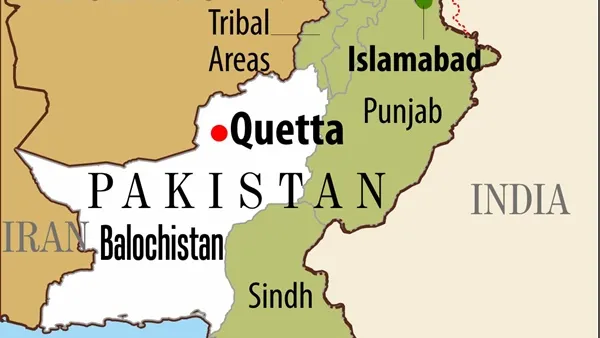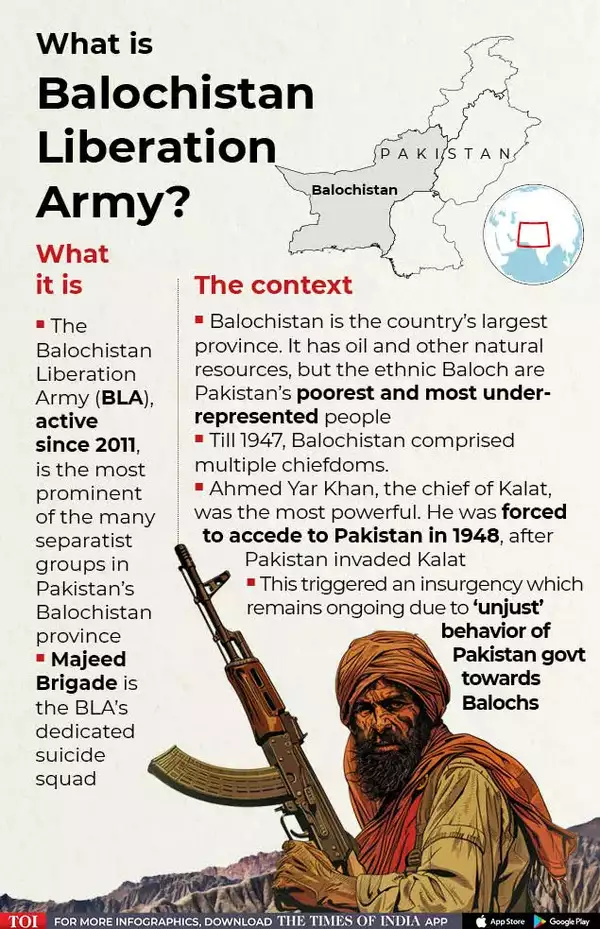Syllabus: GS2/IR
Context
- The Balochistan Liberation Army (BLA) has claimed responsibility for hijacking the Jaffar Express.
About Balochistan
- It is the largest but least populated of Pakistan’s four provinces – Balochistan, Sindh, Punjab and Khyber Pakhtunkhwa.
- Ethnic Groups: Baloch, Brahui, and Pashtuns.
- It has substantial reserves of oil and gas, alongside gold and copper deposits, but has lagged in economic growth compared to other regions in the country.
- The province has been the site of a series of insurgencies, brutal state repression, and an enduring Baloch nationalist movement since 1948.

Background of the Insurgency
- 1947 Partition of Balochistan: The region was divided into four princely states: Kalat, Kharan, Las Bela, and Makaran.
- During Partition, Kharan, Las Bela, and Makaran chose to join Pakistan, while Kalat opted for independence.
- Treaty with Muslim League: On August 11, 1947, Kalat signed a treaty with the Muslim League, recognizing its independence.
- British Resistance: Despite recognition, the British issued a memorandum stating the Khan of Kalat was unprepared for international responsibilities.
- Pakistan Military Action: On March 26, 1948, the Pakistan Army moved into Baloch coastal regions (Pasni, Jiwani, Turbat).
- The Khan of Kalat had no choice but to agree to merge with Pakistan.

Insurgency and Discontent
- Forceful Integration: The annexation of Kalat into Pakistan led to discontent and resistance among the Baloch people.
- Many nationalists saw the integration as a betrayal of their autonomy and cultural identity.
- Insurgencies: Balochistan experienced numerous uprisings for independence, though Pakistan managed to suppress them.
- Current Status: Once a sovereign state, Balochistan is now the most neglected and poverty-stricken province of Pakistan.
- Despite being the largest province and rich in minerals, Balochistan contributes only about 4% to Pakistan’s economy.
- Balochistan Liberation Army: The BLA are a Baloch ethnonationalist group who emerged in the 2000s with the aim of achieving independence for Balochistan.
- Pakistan banned the organisation in 2006, and the United States designated it as a global terrorist organisation in 2019.
India’s Stand on Balochistan
- Complex Position: India’s stance on Balochistan is shaped by geopolitics, regional stability, and its relationship with Pakistan.
- The India-Pakistan conflict over Kashmir makes any involvement in Balochistan a potential trigger for escalating tensions.
- Support for Self-Determination: India supports the right to self-determination for Balochistan’s people but avoids interfering in Pakistan’s internal affairs.
- Overall, India’s stance on Balochistan involves expressing concerns about human rights violations without interfering into the internal affairs.
Source: IE
Previous article
The Immigration and Foreigners Bill, 2025
Next article
Compassion in Health Care